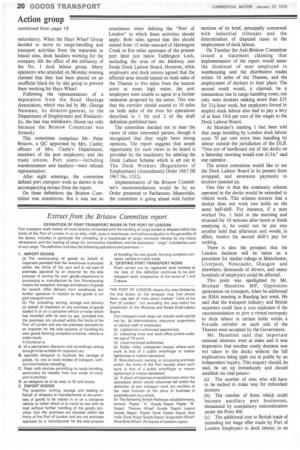Extract from the Bristow Committee report
Page 22

If you've noticed an error in this article please click here to report it so we can fix it.
DEFINITION OF PORT TRANSPORT WORK IN THE PORT OF LONDON Port transport work means all work directly connected with the handling of cargo landed or shipped within the limits of the Port of London in or on ship, craft, quay or warehouse, and without prejudice to the generality of the above, includes in particular the unloading at a warehouse of cargo conveyed thereto by any means whatsoever and the loading of cargo for conveyance therefrom, and the expression "cargo" includes'any part of any cargo. The definition includes the following operations and premises: 1. IMPORT GOODS tel The warehousing of goods on behalf of importers provided that the warehouse is situated within the limits of the port and is not part of premises operated by an importer for the sole purpose of storing his own goods preparatory to processing or manufacture by him. Warehousing means the reception, storage and delivery of goods for reward. After delivery from warehouse any further operation in relation to the goods is not port transport work.
(b) The unloading, sorting, storage and delivery on behalf of importers at any premises of goods loaded in or on a container vehicle or trailer which has travelled with its load by sea, provided that the premises are situated within the limits of the Port of London and are not premises operated by an importer for the sole purpose of handling his own goods forming complete container, vehicle or trailer loads.
A Container is A. of a permanent character and accordingly strong enough to be suitable for repeated use: B. specially designed to facilitate the carriage of goods, by one or more modes of transport, without intermediate reloading: C. fitted with devices permitting its ready handling. particularly its transfer from one mode of transport to another: D. so designed as to be easy to fill and empty.
2. EXPORT GOODS The reception, sorting, storage and loading on behalf of shippers or manufacturers at any premises of goods to be loaded in or on a containervehicle or trailer which is to travel by sea with its load without further handling of the goods, provided that the premises are situated within the limits of the Port of London and are not premises operated by a manufacturer for the sole purpose of handling his own goods, forming complete container. vehicle or trailer loads.
3. EXISTING PORT TRANSPORT WORK Work carried out by registered dock workers at the date of this definition continues to be port transport work irrespective of the terms of 1 and 2 above.
THE PORT OF LONDON means the area limited by the line drawn on the annexed map [not shown here—see text of main story] marked "Limit of the Port of London", but excluding the area within the jurisdiction of the Medway and Swale Dock Labour Board.
Port transport work does not include work carried out by: (a) Administrative, executive, supervisory or clerical staff of employers.
(b) Lighterman's unlicensed apprentices.
lc) Labouring boys and dock office juniors under the age of 18 years.
Id) Local municipal authorities.
le) Public utility companies (except where such work is that of a public wharfinger or master lighterrnan or master stevedore).
(f) Manufacturers owning or occupying premises within the limits of the Port (except when such work is that of a public wharfinger or master lighterman Or master stevedore).
(g) A place of business or establishment when the operations which would otherwise fall within the definition of port transport work are ancillary to the main function of the place of business or establishment as a whole.
(h) The following British Railways establishments. namely: Poplar "A" Goods Depot; Poplar "B" Depot: Thames Wharf Goods Depot; Leacut Goods Depot: Poplar Dock Goods Depot: East India Dock Road Goods Depot; Angerstein Wharf; Nine Elms Wharf; All depots of western region.








































































































